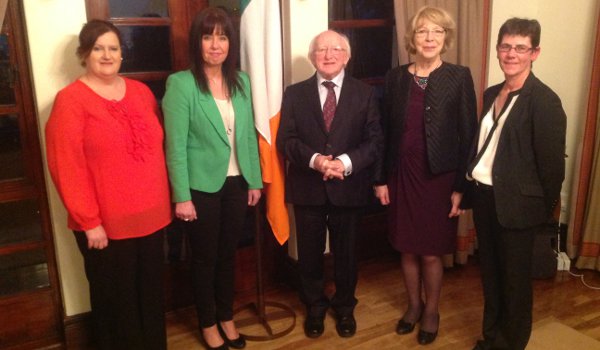LAST month the death of Nelson Mandela threw a surprising light on Irish society and on Irishness itself.
In attendance at his memorial service were such politically dubious figures as the Spice Girls, who counted as an inspiration Margaret Thatcher, who considered Mandela a terrorist; David Cameron, who visited South Africa as part of a group supporting South Africa whilst Mandela was still in prison; and our own Bono, who we all know enough about to feel uncomfortable with.
Also in attendance though were some Irish people of whom we can all feel proud even though they rank far away from the celebrities and politicians who would attend anything where there was a camera.
Mary Manning, Cathryn O’Reilly, Karen Gearon, Theresa Mooney, Vonnie Munroe, Sandra Griffin, Alma Russell, Michelle Gavin, Liz Deasy, Dorothy Dooley, Tommy Davis and Brendan Barron were 12 ordinary working-class Dubliners working on the tills at Dunnes Stores.
In July 1984, in accordance with a Trade Union vote, Mary Manning explained to a customer at the till that she could not take for South African fruit.
Shortly afterwards Dunnes Stores suspended her whereby the colleagues above joined her, began picketing the store and stayed out on strike for two-and-a-half years on strike pay of £21 per week.
The strike only ended when the Irish Government introduced a ban on the importation of South African fruit and vegetables into Irish supermarkets. Nelson Mandela himself was to later call them an ‘inspiration’.
At the time they received little support from the Irish Congress of Trade Unions, were spat at and called ‘nigger lovers’ by members of the Irish public and were even visited at home by members of the Special Branch. Still they carried on.
Ordinary working-class shop workers, the kind of people who are never held up to any of us as exemplars of Irish society.
Meanwhile the Irish Rugby Football Union, a sport played by and supported by the kind of people often held up to us as the pillars of Irish society, continued to organise, play and support matches against the Springboks, the sporting symbol of South Africa.
 President Higgins with his wife Sabina and the Dunnes Stores Workers in the Irish Ambassadors Residence in Pretoria, South Africa
President Higgins with his wife Sabina and the Dunnes Stores Workers in the Irish Ambassadors Residence in Pretoria, South AfricaIn 1981 the IRFU toured South Africa against the wishes of the Irish Government with the notable exceptions of the players Hugo McNeill, Tony Ward and Donal Spring, who refused to play.
Even the Irish Times rugby journalist Gerry Thornley has recently written that ‘no sport propped up apartheid in South Africa more than rugby’ and the IRFU were very much a part of that.
Of course, there are those who say politics and sport have nothing to do with each other but that’s a bit like saying politics only exists inside parliaments.
Politics is everywhere. In the aisles and checkouts of a supermarket and the terraces of a football stadium.
Indeed those Celtic fans with their ‘Terrorist or Dreamer’ banner next to pictures of William Wallace and Bobby Sands might understand this better than most.
That they should be so roundly condemned for this suggests not so much a difficulty with politics on behalf of football authorities but a difficulty the SFA have with Celtic having an Irish identity.
It was not so long ago that Margaret Thatcher was talking about the ANC, the IRA and the PLO as simply terrorist organisations.
The truth remains that to some people Nelson Mandela was a terrorist and to others a freedom fighter long before he became an international symbol. Why can Bobby Sands not be both?
The reality is though that Irish society is, by and large, a little embarrassed by the overt Irishness of a football club like Celtic. It is a little embarrassed about the truth of such a respectable game as rugby’s relationship with apartheid.
It is a little embarrassed that the finest, most ethical, bravest proponents of supporting the suppressed majority of South Africa were ordinary shop workers in Dublin. It is not comfortable with the symbols of Celtic, the shame of rugby or the pride of ordinary people.
It is fitting that a man like Nelson Mandela be honoured and fitting that Ireland’s President is there to represent us. We should not though allow ourselves to be swept along without acknowledging the truth of his story.
Where Ireland is concerned, the people who supported him were ordinary working-class people in ordinary jobs and the ones who let him down were the exact opposite of that.
In that way, and in what he politically represented, Nelson Mandela says, surprisingly, an awful lot about Ireland.

